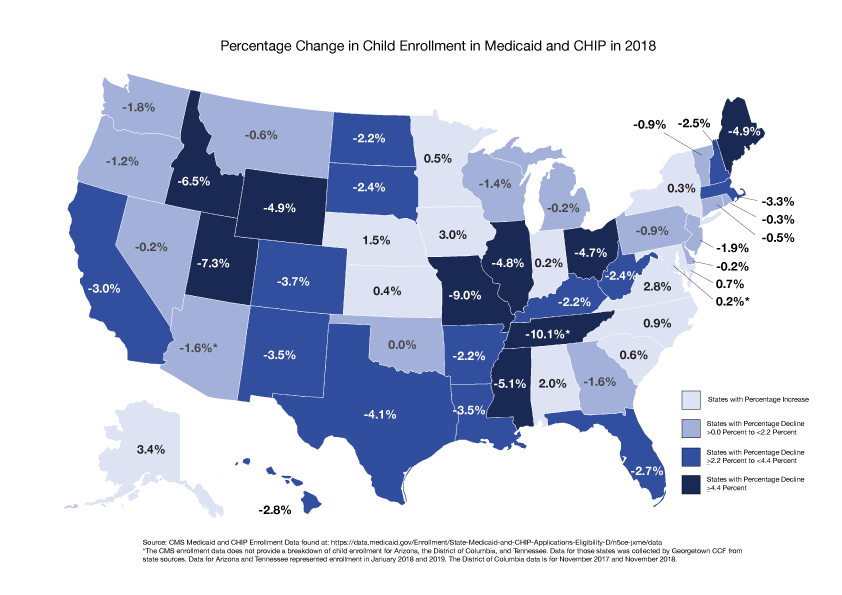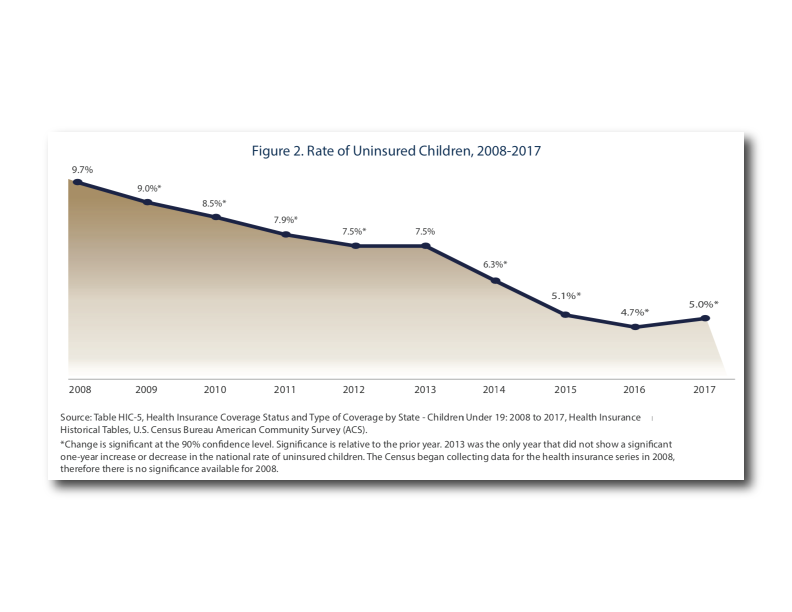Texas
-
Anne Dunkelberg Wins Bulldog of Year Award from Georgetown University CCF
One of the main highlights of our annual conference is the presentation of the Bulldog of the Year award. The award recognizes an individual who best embodies the spirit of the Georgetown University mascot, Jack the Bulldog, through their tenacious efforts on behalf of children and families. This year we bestowed the honor on a true…
-
Real Protections for Kids and Families in the Newest Texas Medicaid Managed Care Laws
In June 2018, the Dallas Morning News began publishing a series of in-depth investigative reports on Texans harmed through Medicaid managed care, potential conflicts of interest, and weaknesses in oversight and enforcement of Medicaid managed care contracts. The articles resulted in public hearings in the Texas House of Representatives that further explored the issues and allowed the public to comment. In…
-
New Texas Report Details Opportunities to Keep Moms Healthy During the Fourth Trimester
“If we want kids, moms, and communities to thrive in Texas, then we need to help local moms stay healthy.” — Adriana Kohler, Senior Health Policy Associate, Texans Care for Children A new report, Healthy Moms Raising Healthy Babies: Central Texas and Statewide Challenges and Opportunities to Support Maternal…
-
Why Are So Many Children Losing Medicaid/CHIP Coverage?
Along with the American Academy of Pediatrics, First Focus and the Children’s Defense Fund, Georgetown University CCF held a press tele-conference and released a report examining an alarming trend in children’s health coverage. The report shows that more than 800,000 fewer children had Medicaid/CHIP coverage at the end of 2018 compared to 2017. This trend…
-
One In Four Texas Women Of Childbearing Age Doesn’t Have Health Insurance.
KUT 90.5 – Austin’s NPR Station By: Ashley Lopez Texas has the highest percentage of uninsured women between the ages of 18 to 44, according to a new study from the Georgetown University Center for Children and Families. The study found that, nationwide, 12.3 percent of women of childbearing age don’t have health insurance. The rate…
-
New Data Show Widespread Decline in Child Enrollment in Medicaid/CHIP Coverage in 2018
We’ve been anxiously awaiting the release of final Medicaid and CHIP enrollment data for 2018, which was expected to be posted almost a month ago. The wait is finally over but not our concerns about what’s happening. In the meantime, more stories about eligibility system issues in a handful of states and states conducting more…
-
2016 Maps
The interactive maps and data for 2016 provide information on the percent of adults and children covered by Medicaid and/or CHIP.You can embed these maps on your website by selecting a state on the left then copying the embed code on the right side of the map and pasting it into a post on your…
-
First Steps: A Spotlight on Check-ups and Developmental Screenings for Young Texans
A baby’s brain forms more than 1 million new neural connections every second. This incredible rate of early brain development, supported by nurturing and engaged caregivers, provides a foundation for children to master new skills like crawling, walking, language, and social interactions. Experiences during this period of rapid growth and early brain development pave the…
-
Texas This Week: Cuts to funding for Texas babies with disabilities
KVUE By: Ashley Goudeau Goudeau: As if these cuts to ECI funding wasn’t enough, you guys are also releasing this week a study that you did in joint with the Georgetown University Center for Children and Families that looked into insurance rates for children, and it doesn’t look good for Texas. Clark: “It does not…
-
New Report Shows Progress on Children’s Health Coverage Reversed Course
[Editor’s Note: For the most recent Georgetown University Center for Children and Families report on children’s health coverage and an interactive version of the report with state-by-state data, click here.] For the past eight years, CCF has published a report tracking health coverage rates for children across the country. This year, for the first time…
-
Nation’s Progress on Children’s Health Coverage Reverses Course
Introduction For the first time since comparable data was first collected in 2008, the nation’s steady progress in reducing the number of children without health insurance reversed course. The number of uninsured children under age 19[note] This report examines children under age 19 because of changes to the health insurance age categories in the 2017…
-
Texas high in uninsured rural, low-income health coverage
The Huntsville Item By: John Austin Texas scores well in a lot of rankings, but the number of rural and small-town residents with health coverage isn’t one of them. More than one third — 36 percent — of rural/small-town Texans lack health insurance, versus 29 percent of metro residents. … Of those, Texas is No.…
-
Texas, Oklahoma Have Higher Rates Of Uninsured Rural Adults
High Plains Public Radio By: Angie Haflich Texas and Oklahoma were among non-Medicaid expansion states with the highest rates of uninsured adults, especially those living in rural areas. … According to a study released Tuesday from Georgetown University and the University of North Carolina, of non-elderly uninsured adults, the rates of those living in rural…
-
State Medicaid and CHIP Snapshots, 2018
The Georgetown University Center for Children and Families (CCF) and the American Academy of Pediatrics (AAP) created factsheets underscoring the importance of Medicaid in providing coverage for children in all 51 states (including the District of Columbia). Sources are available here. Previous snapshots can be found here.
-
“Pain & Profit:” How Not to Do Medicaid Managed Care
We know that CMS Administrator Seema Verma doesn’t think Medicaid should cover “able-bodied” adults. But she does believe that coverage of the “society’s most vulnerable citizens” is the right thing for Medicaid to do. In her major policy address to state Medicaid directors last November, she opened with the stories of Richard, a para-pelagic, and…
-
No Set Federal Notice Period for CHIP – States Decide How Much Notice to Give Families Losing Coverage
According to a new brief by the Kaiser Family Foundation, at least five states (Colorado, Connecticut, Texas, Virginia, and Utah) plan to end coverage for children enrolled in separate CHIP programs by January 31, 2017. One of those states (Colorado) has started to notify families that their children may lose coverage if Congress does not…
-
Why Projecting When States Will Run Out of CHIP Funds is a Moving Target
This week we released a new report on the consequences of delayed Congressional action on the Children’s Health Insurance Program (CHIP). Federal funding for CHIP expired 27 days ago, an unprecedented lapse in CHIP’s 20-year history. Some policymakers have reasoned that the situation is not urgent because all states have some unspent funds available from…
-
What Are the Consequences of Congressional Delay on CHIP?
Funding for the Children’s Health Insurance Program (CHIP) expired nearly a month ago and Congress still has not passed legislation to extend funding. Researchers at Georgetown University’s Center for Children and Families took a look at the consequences of the delay in CHIP funding. “This delay in funding CHIP is really unchartered territory and puts…
-
Nationwide Rate of Uninsured Children Reaches Historic Low
Nationwide 95.5 percent of children had health insurance in 2016, up from 95.2 percent the previous year—and up from 92.9 percent in 2013, the year before the ACA was fully implemented. While relatively few children rely on the ACA’s Marketplace for insurance, many gained coverage in Medicaid or CHIP when their parents signed up for…
-
Will Congress Renew CHIP Before Texas Funding Runs Out?
Houston Public Media By Abner Fletcher Insurance coverage for more than 390,000 Texas children and pregnant women is in jeopardy. Patrick Bresette, executive director of the Children’s Defense Fund’s Texas office, joins us to discuss how the CHIP program works, its history, and what hurdles remain to its reauthorization. Read more here.















